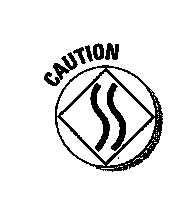The first time I tuned my car, I was sure that if I made the smallest mistake, the car would explode when I started it. This seems to be a common delusion, but it just isn’t so. All you’ll get is silence (which can be just as disconcerting, but not lethal after all). This isn’t to say that working on cars is free from danger, though. Before you do any work on a vehicle, be sure to observe the following safety rules:

Don’t smoke while you’re working on your car — for obvious reasons!
Never work on your car unless the parking brake is on, the gearshift is in Park or Neutral, and the engine is shut off. If you have to run the engine to adjust something, turn it on and off yourself to avoid the risk
that a friendly helper may misunderstand and turn the engine on while your hands are in the way.
Be sure that the parts of the engine you’re working on are nice and cool so that you don’t get burned. If you’re doing a job that calls for a warm engine, be very careful.
Never jack a car up unless the wheels are properly blocked. I go into more detail about this later in this chapter in the “The Safe Way to Use a Jack” and “How to Change a Tire” sections.
Use insulated tools for electrical work.
Before using a wrench or ratchet on a part that’s “stuck,” make sure that, if it suddenly comes loose, your hand won’t hit anything. To avoid the possibility of being injured because your hand slams into something, pull on wrenches whenever possible rather than pushing on them.
Take off your rings, long necklaces, or other jewelry. If they get caught on parts, they — and you — can be damaged.
Tie back long hair. If your hair accidentally gets into a moving fan or belt, you can literally be scalped.
If you’re working with toxic chemicals, such as antifreeze, cleaners, and the like, keep them away from your mouth and eyes, wash your hands thoroughly after using them, and either store them safely away from pets and children or dispose of them in a way that’s good for the environment. (For examples, see the next paragraph and the sidebar “How to dispose of empty gasoline cans safely,” later in this chapter.)
Know that gasoline is extremely dangerous to have around.
Not only is it toxic and flammable, but the vapor in an empty can is explosive enough to take out a city block. If you must keep a small amount of gasoline on hand for a lawn mower or chain saw, always store it in a ventilated gasoline can designed specifically for that purpose. Unless you’re going far into the wilds, never carry a can of gasoline in or on your vehicle.
Work in a well-ventilated area to avoid breathing in carbon monoxide if you have to run the engine, or breathing in toxic fumes from chemicals and gasoline. If possible, work outdoors in your driveway, your backyard, or a parking lot. If you must work in your garage, be sure to keep the garage door open and move the vehicle as close to the door as possible.
Keep a fire extinguisher handy.
You can find reasons for this that may surprise you in Chapter 2.
So much for the scary stuff. It’s all a matter of common sense, really. And remember: Making a car blow up is almost impossible unless you drop a match into the fuel tank. If you do something incorrectly, the worst thing that will probably happen is that the car won’t start until you get it right.
